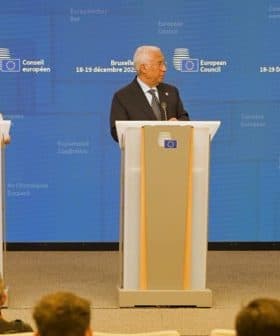Spanish Olive Exports to US Plummet Since Tariffs Imposed
The tariffs are slowly redefining the global table olive trade as new producers fill the void left by Spain in the U.S. market and Spanish growers look to the east to sell their crop.
Since the U.S. imposed tariffs on Spanish black olives in August 2018, exports to the U.S. have plummeted, causing concern for the Spanish olive industry, which has lost €25.5 million ($28.4 million) and hundreds of jobs. Morocco, Portugal, and Egypt have benefitted from the trade dispute, with their olive exports to the U.S. increasing significantly, while Spanish producers are now looking to other markets like China, India, and Pakistan.
Spanish black olive exports to the United States have fallen drastically since the U.S. slapped tariffs on the product last year.
Black olive exports fell from 7,385 tons in the first quarter of 2017 to 3,850 tons in the first four months of 2019, according to figures from Asemesa, the association of Spanish table olive producers and exporters.
The forecast is to lose most of the U.S. black olive market progressively.
Previously, 75 percent of Spain’s black olive exports made their way to the U.S. That figure has since fallen to 34 percent and many producers have been left with nowhere to sell their olives. Some estimate that the tariffs have cost Spanish olive producers €25.5 million ($28.4 million) since they came into force in August 2018 and have led to hundreds of layoffs across the sector.
Officials at Asemesa and throughout the Spanish table olive industry are also concerned that these tariffs will lead to a progressive decline in Spanish table olive sales in the U.S., even if the tariffs are blocked by the World Trade Organization or lifted.
See Also:Table Olive News“The forecast is to lose most of the U.S. black olive market progressively,” Antonio de Mora, the secretary general of Asemesa, told Merca2, a Spanish business publication. “This is something that will depend, in a large way, on the capacity of California and the other countries that export black olives to the U.S. to replace Spain.”
Morocco, Portugal and Egypt have been the largest beneficiaries of the trade spat between the two countries, seeing their respective market shares increase to fill the vacuum left by Spain.
Morocco has been the biggest beneficiary so far. Its table olive exports to the U.S. have increased by 800 percent since 2017. Portugal and Egypt have both enjoyed more modest gains, seeing exports rise by 80 percent and 130 percent, respectively, over the same period of time.
Sales of California-grown olives have also increased since 2017, albeit to a much lesser extent, rising by 5.7 percent.
De Mora said that he expects black olive exports to the U.S. to continue falling for as long as the tariffs are in place.
This forecast has led many growers to acknowledge that they may have been over-reliant on the U.S. market. As a result, table olive producers are now looking to the east. China, India and Pakistan are all new target markets from Spanish olives.
These tariffs originated from an anti-dumping complaint brought by the U.S. Department of Commerce and a separate anti-subsidy complaint filed by two California producers to the U.S. International Trade Commission (USITC). On August 1, 2018 tariffs on table olives rose as high as 27 percent.
In response, the European Union filed a formal complaint on behalf of Spain with the World Trade Organization, last February. The trade bloc called the tariffs “unjustified” and “unwarranted.”
The E.U. later requested the formation of a special task force to investigate the subsidies after bilateral arbitration talks with the U.S. fell apart in March.
However, for the formation of the task force to go ahead, a unanimous vote of all the members was required. The U.S. representative voted against the task force.
In its defense, the E.U. said that it had “serious concerns” about the U.S. investigation that led to the tariffs, including “the U.S. targeting of non-specific subsidies, the absence of a pass-through analysis and the failure to show the imported olives were causing injury to U.S. producers.”
The U.S. responded that it “regretted the E.U.‘s decision to request a panel and that the duties on Spanish olives were imposed only after thorough investigations were carried out that were fully in line with WTO rules.”
The E.U. will request the formation of a special task force once again at the WTO Dispute Settlement Body’s next meeting on June 24.
Until then, uncertainty and anxiety remain strong feelings throughout the sector. In the province of Seville, where most of Spain’s black olives are grown, producers have had to trim expenses, usually by laying off workers or selling their olives for substantially less money to olive oil producers.
“The industry and the sector are still waiting for important measures of support from the E.U. and the rest of the Spanish administrations to compensate for the loss of turnover in the U.S. and the huge expense that the defense [of the sector] is taking on before the U.S. measures,” de Mora said.









